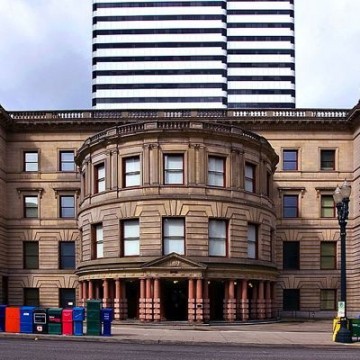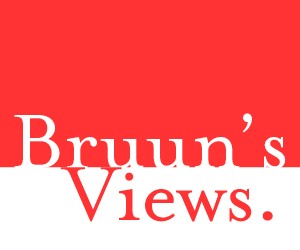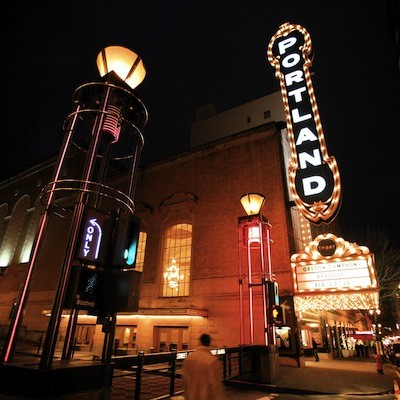Scott Bruun: The Problems With Portland’s City Government
Wednesday, January 14, 2015
Scott Bruun, GoLocalPDX MINDSETTER™
 So maybe they just need a little field trip, right? Portland State University’s Mark O. Hatfield School of Government is only a short walk from City Hall. And while visiting, hopefully they can even make the time to sit in on a class or two. Maybe even take a refresher course on “resource prioritization” or catch a lecture on “proper policy implementation.”
So maybe they just need a little field trip, right? Portland State University’s Mark O. Hatfield School of Government is only a short walk from City Hall. And while visiting, hopefully they can even make the time to sit in on a class or two. Maybe even take a refresher course on “resource prioritization” or catch a lecture on “proper policy implementation.”
The School is a great resource after all, designed to help teach good governance. And looking at Portland’s street fee disaster-in-progress, the City Council could use all the help it can get.
Let’s recall how we got here. For years, the City Council has focused its attention and our resources on the types of transportation modes that the majority of Portland commuters do not use. Think of the Portland Streetcar, as one example.
Over those years, with resources going elsewhere, the Council stood by and watched as our streets and roads were slowly ground-down to near ruin. This totally foreseeable circumstance has now left the City unable to meet the basic needs for the type of transportation that the majority of Portland commuters actually do use. Like driving cars or riding busses. On streets.
Not only has the City Council long misspent transportation resources, it has also deprioritized transportation investments in general. Meaning, resources that should have gone toward transportation infrastructure and street repairs have been diverted, for years, to other priorities. Priorities like the Regional Arts & Cultural Council, the Portland Center for Performing Arts, downtown beautification and affordable housing in the Pearl District.
Well, there is little argument about the positive role city government can and should play toward arts and beautification. Quality of life, a priori, should be one of the City’s functions. But should it consistently take priority over core municipal functions like public safety and transportation infrastructure?
Seems like the City of Portland should build and maintain a strong house before it spends taxpayers’ money to buy pretty drapes. But now here we are. Pretty drapes and busted streets.
 The difference between proper street maintenance, we are told, and the dismal condition that we find our streets in today, is about $41 million-a-year or so. At least this is what Portland residents are told, and maybe it’s true.
The difference between proper street maintenance, we are told, and the dismal condition that we find our streets in today, is about $41 million-a-year or so. At least this is what Portland residents are told, and maybe it’s true.
What’s also true is that the City of Portland’s annual budget is around $1.8 billion. So consider that the difference between bad roads and better roads, $41 million, is only about 2.3% of the City’s annual budget. Or in other words, our city leaders are either incapable or unwilling to prioritize a little over two cents on the budget dollar. They can’t or won’t find a little over two cents on the dollar to redirect toward the most basic and necessary of city government functions.
So Portland residents are stuck with a Faustian choice between bad roads or more taxes. Some choice.
But wait, it gets worse. Instead of designing and then voting on a new tax or fee structure themselves, the Council now seems inclined to send “options” out to Portland voters in a sort of “non-binding” referendum. Not an ‘up-or-down’ vote, mind you. But instead, an open menu of half-baked tax and fee ideas designed to find the least-worst plan.
To save the City Council from its own bad choices, it wants to toss voters a bunch of “solutions” while simultaneously passing responsibility to those voters for the inevitable bad outcome. Or in other words, throw everything on the wall, from new gas taxes to new income taxes, see what sticks, then leave the mess for others to clean up.
It’s the pasta puttanesca of policy. And it’s a complete abdication of leadership.
So now, with all this going on, chances are the Council won’t find time to take that field trip. Touring the Hatfield School at PSU will have to wait. That’s too bad, but all is not lost. You see the actual students of government at that school itself can still benefit. They just need to take a long look down the street at Portland City Hall, and take some notes.
Looking there, those students will find everything they need to write a thesis titled “What Not to Do in City Government”.
 Scott Bruun is a fifth-generation Oregonian and recovering politician. He lives with his family in the 'burbs, yet dutifully commutes every day to Portland, where he earns his living on the fifth floor of Big Pink.
Scott Bruun is a fifth-generation Oregonian and recovering politician. He lives with his family in the 'burbs, yet dutifully commutes every day to Portland, where he earns his living on the fifth floor of Big Pink.
_400_400_90.jpg)







_400_300_90.jpg)

 Delivered Free Every
Delivered Free Every
